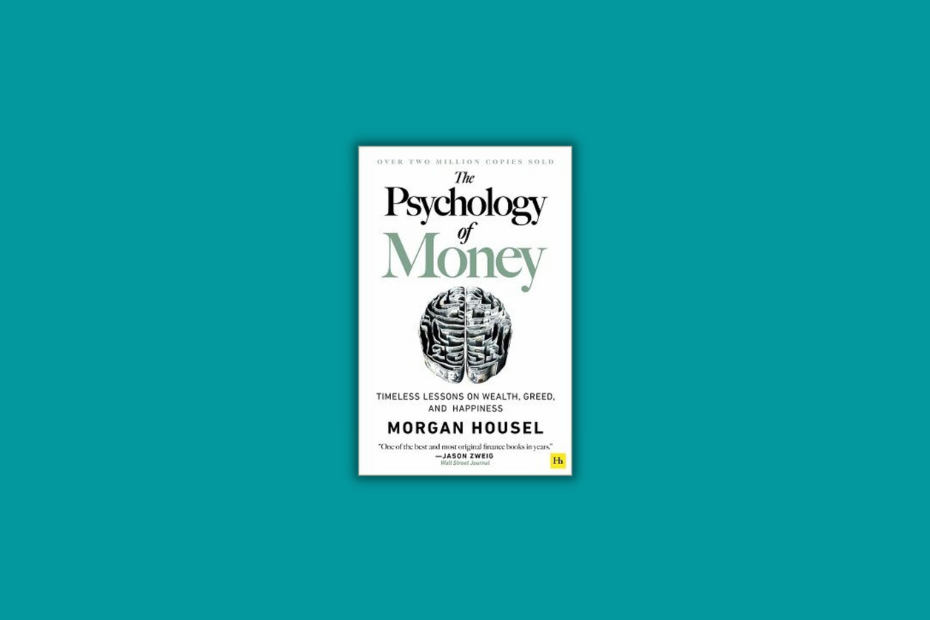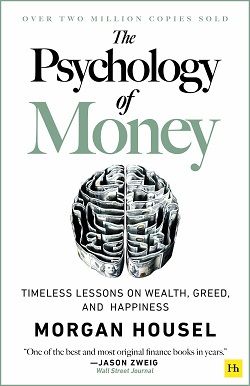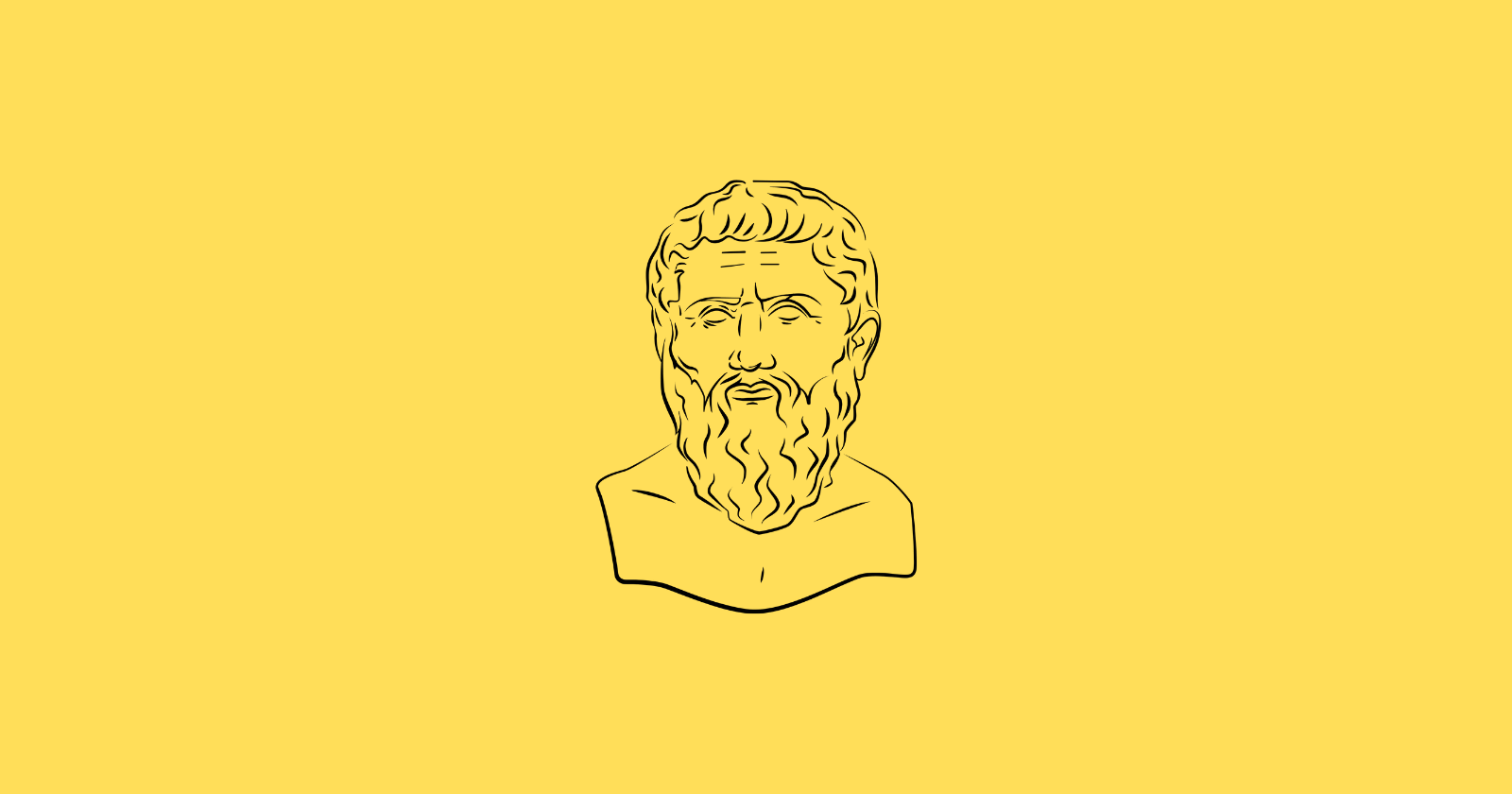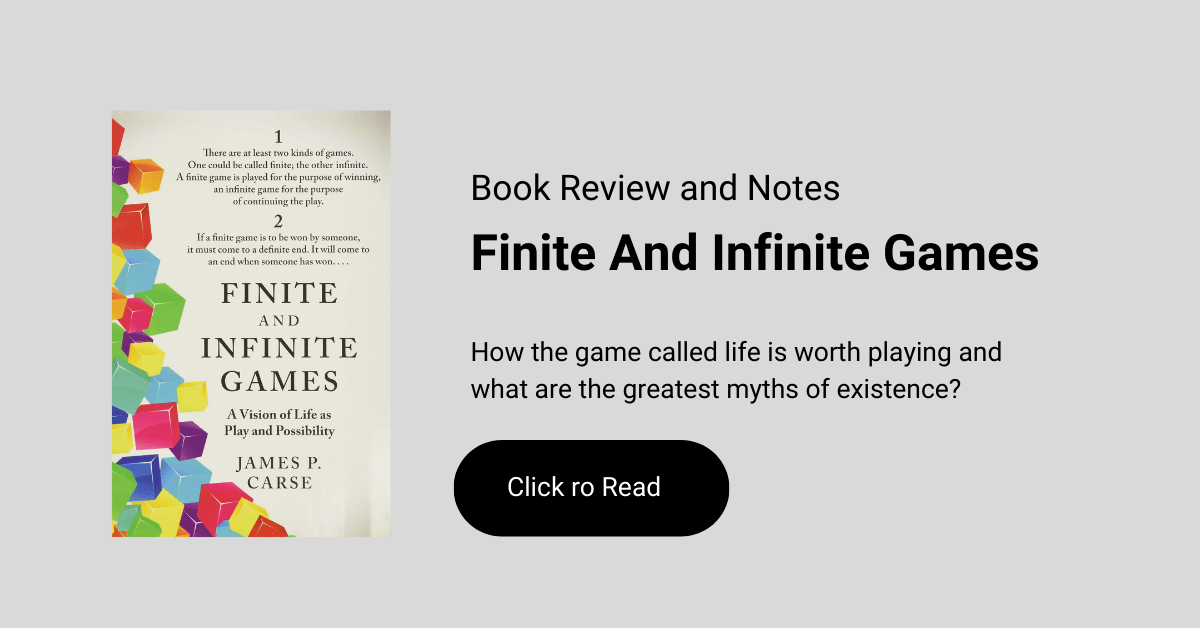The Psychology of Money: Summary & Review
In The Psychology of Money author Morgen Housel uses interesting stories to illustrate our unlogical behavior with money. We are taught that money is science while it is rather stories, emotions, and soft skills.

Morgan Housel is one of my favorite financial writers. He is an ex-columnist of The Wall Street Journal and The Motley Fool, his unique style of combining personal finance with global economic trends has already produced writings that I can't stop recommending.
In his book, The Psychology of Money: Timeless Lessons on Wealth, Greed, and Happiness, Housel uses interesting stories to illustrate our behavior towards money. The author argues that how smart we are and how we behave has little to do with how well we manage money.
Morgan Housel writes about these behaviors, tips, and psychological tricks.

The Summary of The Psychology of Money
- Increase your investment time horizon! Time increases gains and smooths out losses.
- Know what game you are playing! Don't compare yourself to others! Know what is important to you and plan your financial goals accordingly!
- The most important thing is your savings rate! It's not how much you earn, nor the return on your investments. You can build wealth without a high income, but not without a high savings rate.
- Freedom makes you happier than money! Use your money to redeem your time.

The Psychology Of Money: Timeless Lessons On Wealth, Greed, And Happiness
by Morgan Housel
Introduction
The story of the millionaire janitor and the broke top exec
Ronald James Read spent 25 years working in a gas station and 17 years as a janitor at a J. C. Penney. Read was the first in his family to graduate from high school. He had an average job with modest earnings, from which he saved a lot. And he invested his savings in blue chip stocks.
In his will, Read left $2 million to his stepchildren and $6 million to the local hospital and library.
Richard Fuscone, a former top executive at Merrill Lynch, lived not far from Ronald Read in his eleven-bedroom luxury mansion. Fuscone graduated from Harvard, had a successful career, and retired early to work in charitable causes.
Fuscone went bankrupt in 2000 and lost almost everything.
There are two possible explanations for the story of Ronald Read and Richard Fuscone:
- Financial results are largely influenced by luck, independent of individual intelligence and effort.
- Financial success is not science-based, but a soft skill. How you behave is more important than what you know.
This soft skill is the psychology of money.
But not many of us possess this soft skill.
Mostly because we think and are taught about money as if it were a science like physics (describable by rules and laws) rather than psychology (laced with emotions and nuances).
To find out why people take unjustified amounts of credit, it is worth studying not interest rates but the history of greed, uncertainty, and optimism.
1. No one is crazy
We are challenged by the fact that no amount of learning or open-mindedness can truly restore a sense of fear and uncertainty.
I can read about what it was like to lose everything during the Great Depression, but I don't have the same emotional scars as those who actually experienced the crisis.
Every financial decision a person makes, it makes sense to them at the time.
Lottery
Americans spend more on lottery tickets than on movies, video games, music, sporting events, and books combined.
And who plays the lottery?
Mostly the poor.
The lowest-income American households spend an average of $412 a year on lottery tickets. Four times more than the highest income households.
The people who buy $400 worth of lottery tickets are the same people who say they are unable to save $400 for unexpected expenses. They are burning their safety net for something that has a one-in-a-million chance of coming in.
If you put yourself in the shoes of the poorest of the poor, you realize that for the low-income, the lottery ticket is a rational choice.
The lottery ticket is the only chance in their lives to get all the good stuff you take for granted. They are paying for a dream that you can't understand because you are already living that dream.
That's why the less wealthy buy more lottery tickets than you do.
2. Luck and risk
Luck and risk are siblings.
The trick to dealing with failure is to plan your financial life so that a bad investment here, or a missed financial goal there can't bring you to your knees, so you can gamble until the odds are in your favor.
Years ago, the Nobel Prize-winning economist Robert Shiller was asked, "What would you like to know about investing that we don't know now". "The exact role of luck in successful outcomes." - he replied.
3. When it's never enough

The most complicated financial skill to master is the ability to set your goals. But it's also one of the most important.
Social comparison is the biggest problem here. As Nassim Taleb explains:
“True success is exiting some rat race to modulate one’s activities for peace of mind.”
There are many things not worth risking. In such cases, the potential gain is irrelevant.
Don't get too attached to anything - fame, achievement, or the like. If one thing has unjustly ruined my reputation it only bothers me if I cling to my reputation.
Ideas like letting things go and mentally writing them off from your balance sheet are something that dates back to the stoics:

4. Compounding wins

The great lesson of the Ice Age is that you don't need an incredible amount of power to achieve incredible results.
An ice age starts when summer can't warm up enough to melt the previous winter's month. The ice left behind makes it easier to accumulate snow the following winter, which makes it even easier to accumulate even more snow the following winter. Perpetual snow reflects more sunshine, which results in more snow.
In a few hundred years, a seasonal snowpack turns into an all-encompassing continental ice sheet.
When something adds up, a little baseline can lead to extraordinary results that defy logic.
5. Becoming vs. staying wealthy
Getting money requires taking risks, being optimistic, and putting yourself out there. But keeping money requires the opposite of taking risk. It requires humility, and fear that what you’ve made can be taken away from you just as fast. It requires frugality and an acceptance that at least some of what you’ve made is attributable to luck, so past success can’t be relied upon to repeat indefinitely.
6. How to win
Successful art dealers work like an index fund.
Traders buy artworks in a portfolio, not individually.
After buying, they wait a few years for the valuable pieces in the portfolio to increase in value. It is not the sum of the value of all the paintings that makes the portfolio profitable, but the few exceptions that become disproportionately valuable.
The Russell 3000 index has grown seventy-three times since 1980. This is a spectacular achievement. A spectacular success. But 40% of the companies in the fund have virtually failed. However, 7% of the fund's companies have performed so extremely well that they have more than compensated for the losses.
7. Freedom
Research has shown that a sense of control over life is a more reliable predictor of positive well-being than any other objective circumstance in our lives that we take into account.
Psychologists call this phenomenon reactivity.
Jonah Berger, a marketing professor at the University of Pennsylvania, summarised reactivity as follows:
"People like to feel they are in control - they are in the driver's seat. When we try to make them do something, they feel powerless. Instead of feeling that they have made the decision, they feel that we have chosen for them. So they say no or do something else, even if they would have liked to do the same thing in the first place."
The ability to do what you want, when you want, for as long as you want has an infinite payoff.
8. The man in the car paradox
When you see someone driving a nice car, you rarely think about how cool the guy driving the car is. Instead, you think about how cool other people would think I was if I had a car like that.
But they wouldn't think I was cool.
You don't think they're cool.
9. Wealth is what you can't see
Wealth is the nice cars not purchased. The diamonds not bought. The watches not worn, the clothes forgone and the first-class upgrade declined. Wealth is financial assets that haven’t yet been converted into the stuff you see.
10. Savings
Wealth building has little to do with your income or investment returns and more to do with your savings rate.
Wealth is just the accumulated leftovers after you spend what you take in. And since you can build wealth without a high income, but have no chance of building wealth without a high savings rate, it’s clear which one matters more.
When you define savings as the difference between your ego and your income, you realize why many people with decent incomes save so little. A daily battle against instinct is to stretch your peacock feathers to the limit and keep up with others who are doing the same.
Saving without a goal
Saving only for a specific purpose makes sense in a predictable world. But ours isn't. Saving is a hedge against life's inevitable surprises so that you're not caught off guard at the worst possible moment.
11. Reasonable > Rational
There is a well-documented "bias towards the home". People invest in the companies of the country they live in while ignoring the other 95% of the planet. This would not be rational until you consider that in investing you are effectively giving money to strangers.
If familiarity helps you make the leap of faith necessary to continue to support these aliens, then the bias towards the home is rational.
Day trading and picking independent stocks is not reasonable for most investors - the odds are heavily against your success. But both can be reasonable in small amounts if your other more diversified investments are not affected.
12. Surprise
Scott Sagan, a professor at Stanford University, once said something that should be posted on the wall of everyone who follows markets and investing:
"Things happen all the time that have never happened before."
If you rely too much on investment history, you will miss the very outliers that matter most. History can be a misleading guide to the future of the economy and the stock market because it fails to take into account structural changes that are relevant in the present.
The interesting quirk of investment history is that the further back you look, the more likely you are to be looking at a world that no longer applies today. Many investors and economists take comfort in the fact that their forecasts are backed up by decades, even centuries, of data. But as economies evolve, the history of the recent past is often the best guide to the future because it is more likely to contain important conditions that are relevant to the future.
The right lesson to draw from surprises is that the world is full of surprises. It is not that we should use past surprises to delineate the boundaries of the future; we simply need to acknowledge past surprises and the fact that we have no idea what might happen next.

13. Possibilities for error
Emotions
Tables can be used to tell you whether the numbers are coming out or not. However, they cannot model well how you will feel when you tuck your children in at night and wonder if the investment decisions you made were mistakes that will harm their future.
The difference between what is technically tolerable and what is emotionally possible is an overlooked version of the potential for error.
Unexpected risks
You can plan for all risks, except those that seem too crazy to even think about. And these crazy things can hurt you the most because they happen more often than you think and you have no plan for how to handle them.
14. The future you is different than you now
It's a basic tenet of psychology that people are poor predictors of their future selves. Envisioning a goal is easy and fun (becoming a doctor). Competitive activity in support of a goal, combined with the increased stressors of real life, is something else entirely (12-hour on-call, lost patient...).
The reason why people like Ronald Read - the wealthy janitor we met earlier in the book - and Warren Buffett have become so successful is because they have been doing the same thing for decades and have let compound interest do the work.
But many of us grow so much over a lifetime that we don't want to do the same thing for decades.
That said, compound interest works best when you allow years, if not decades, for growth. This is true not only for savings but also for careers and relationships.
Persistence is the key.
15. Nothing is free
Everything has a price, and the key to a lot of things with money is just figuring out what that price is and being willing to pay it. The problem is that the price of a lot of things is not obvious until you’ve experienced them firsthand, when the bill is overdue.
16. You and me
It's hard to understand that other investors have different goals than we do. We are incapable, because of a mental error, of understanding that rational people can see the world through a completely different lens to our own.
It is difficult to justify paying $700,000 for a two-bedroom house in Florida in which you plan to raise your children, but it is perfectly logical to buy the same house if you plan to outsell it in a few months in a market with rising prices.
What you don't realize is that the traders who set the share price were playing a different game than you. Sixty dollars for a share was an acceptable price for the trader because he planned to sell the shares before the end of the day when the price was likely to be higher. But sixty dollars was a disaster for you because you wanted to hold the shares for the long term.
The most important thing I can recommend is to do your best to find out what game you're playing.

17. Tempting pessimism
For reasons I've never understood, people like to hear that the world is going to hell. - Deirdre McCloskey
18. Markets are influenced by stories
In 2007, we told a story about the stability of house prices, the prudence of bankers, and the ability of financial markets to accurately price risk.
In 2009, we no longer believed that story.
Only that has changed.
But it changed the world.
Once you choose a strategy or a solution, you invest in it financially and mentally. If you want a particular stock to go up tenfold, growth stocks become your tribe. If you think a certain economic policy will cause hyperinflation, that will be your side.
19. To sum it all up
If you want to perform better as an investor, the most effective thing you can do is to increase your time horizon. Time is the most powerful force in investing. Small things grow big and big mistakes fade away with its help.
Use the money to take back control of your time!
Not having time is a huge and universal blunder against your happiness. The ability to do what you want, when you want, with whom you want, for as long as you want, pays the highest dividend in money.
You have to love risk because it pays off over time. But you should be paranoid about destructive risks because it prevents you from taking future risks that will pay off over time.
20. Definition of Freedom
Independence, to me, doesn’t mean you’ll stop working. It means you only do the work you like with people you like at the times you want for as long as you want.

The Psychology Of Money: Timeless Lessons On Wealth, Greed, And Happiness
by Morgan Housel




